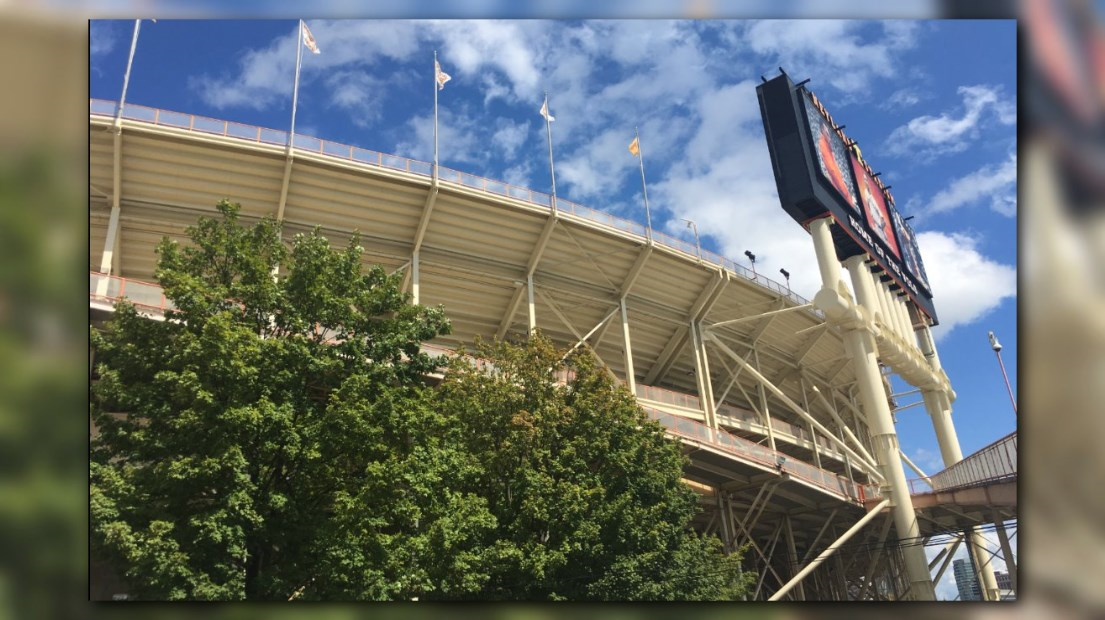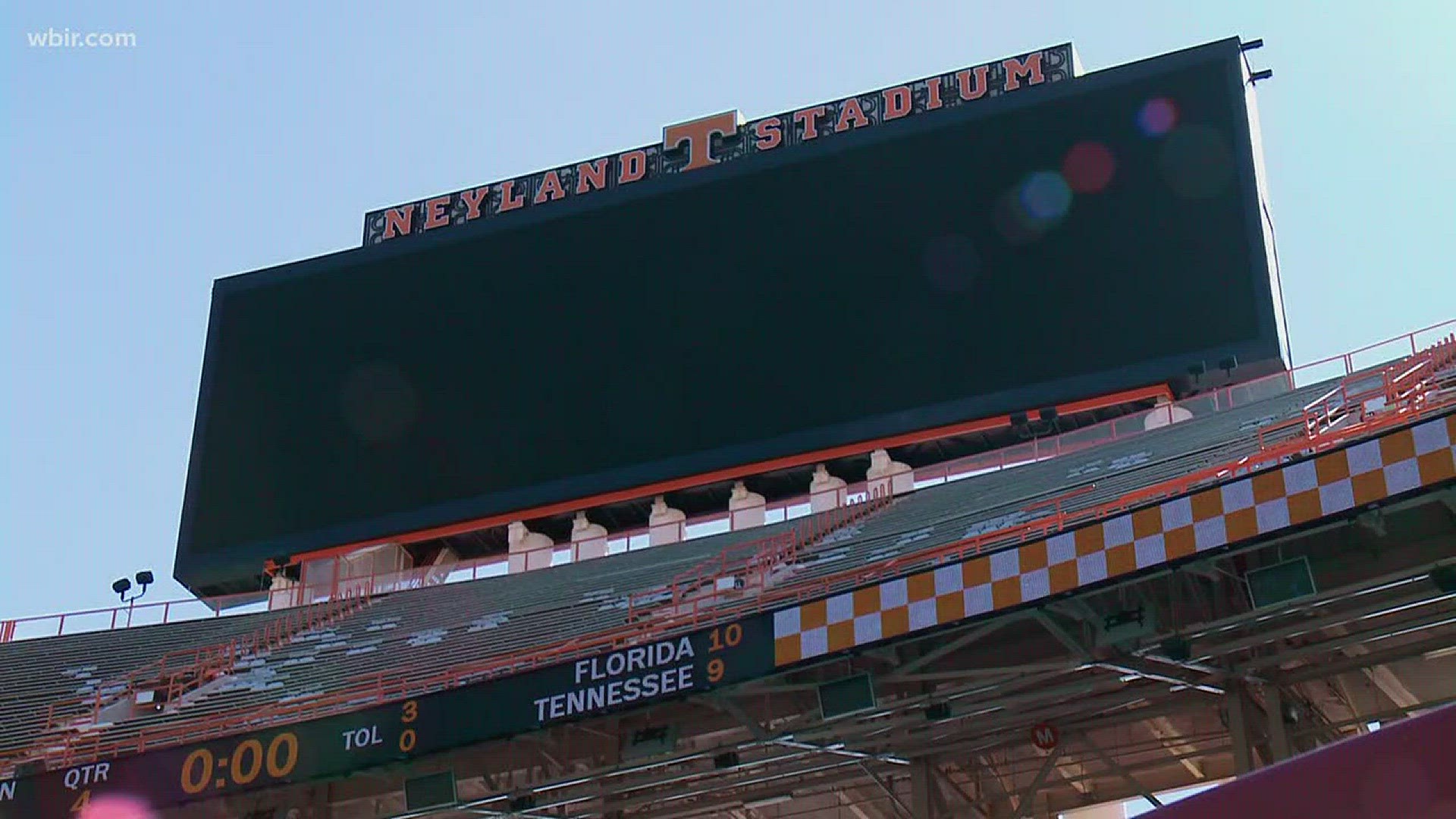UPDATE Friday, Nov. 3, 2017
The University of Tennessee Board of Trustees has voted to authorize a $74 million budget increase for phase one renovations to Neyland Stadium.
According to the university, the board also acknowledge the revised Neyland Stadium Master Plan as a single and unified project.
The board asked for a total of roughly $180 million. In 2016, the Board of Trustees approved the initial phase, of a 3-phase renovation plan, for $106 million.

Athletics Director John Currie said Thursday that the increase in the budget for the first phase will help lower the costs overall in the long run.
"The new, revised master plan, recognized on Friday and pending all required state government approvals, accelerates the pace of the renovations by spreading the overall project scope across two phases," the university said in a release Friday.
"We're excited about the long-term impact of this undertaking on future generations of Tennessee fans," Tennessee Vice Chancellor/Director of Athletics John Currie said.
The estimated total project budget stands at $340 million. Phase one renovations are expected to be complete before the 2020 football season. The second phase of renovations are targeted to be complete as early as opening kickoff of the 2021 campaign. By 2021, Neyland Stadium will have served as the home of Tennessee football for 100 full years, according to the university.
Renderings from the revised Neyland Stadium Master Plan
Gallery 📸 » https://t.co/CubNpj8Hkm pic.twitter.com/M0dYBTHrhW
— Tennessee Football (@Vol_Football) November 3, 2017Tennessee Vice Chancellor/Director of Athletics John Currie issued the following letter Friday:
"Good Afternoon, Big Orange Nation!As I shared in my letter back on Sept. 12, we have been eagerly anticipating the opportunity to share more details about the next steps in the Neyland Stadium Master Plan. The historic home to the football Vols is approaching its Centennial—when the 2021 season kicks off, the venue that hosted its first UT football game as Shields-Watkins Field in 1921 will have served Tennessee fans for 100 full years.
Today, an important milestone in the planning process has been reached, as the University of Tennessee Board of Trustees earlier this afternoon approved our request to increase the scope and budget of the next phase of the Neyland Stadium renovations to $180 million. This will comprise the first and largest segment of what is projected to be a two-phase $340 million project targeted for substantial completion in 2021. Thanks to great cooperation and ingenuity by our project planning team members from the UT system, campus, state and our feasibility study advisors from Populous, what was conceived in 2016 as three individual projects has been consolidated into a single, two-phase project. This shift will provide a much more cost-effective and efficient result while ensuring a consistency in design and finish throughout.
Enhancing the Neyland Stadium game experience for our loyal fans stands at the forefront of five key project goals. The vast majority of the work set to take place during the two upcoming renovation phases will take place in the south and east ends of the stadium. Those areas will be outfitted with modern restrooms (many restrooms in these areas are basically the same as they were built in 1948!), improved concession stands to provide better service, food quality and choices—not to mention improved working conditions for the hundreds of volunteers from local non-profits who staff many of our locations. Our fans in the south and east ends of Neyland Stadium will see average concourse sizes increase nearly 500 percent, providing space for shelter from rain storms or hot sun, family eating areas and gathering spots.
Our second project goal is to address basic safety, security and access—including ingress and egress flow through wider main gates similar to the Gate 21 northwest entry, while the new scissor ramps will be ADA compliant, multiple elevators will be added and the infamous Gate 10 ramp will be retired to memory.
Project goal three is to elevate the presentation of Neyland Stadium to reflect the architectural standards of the university's master plan. Despite the incredible progress made over the last decade in campus beautification and modernization, the appearance of the south stadium area from Neyland Drive and the Tennessee River lags behind what the "first impression" of our historic stadium and campus could be. In conjunction with the upcoming reconstruction of Estabrook Hall and Pasqua Engineering Building, what currently looks like a service entrance will be transformed in a welcoming plaza linking the Tickle Engineering building and Neyland Stadium—a grand "riverfront" approach to campus.
Preparing Neyland for a second century of service to Tennessee fans is our fourth project goal. Tennessee fans who attend games at Neyland Stadium come from all walks of life and represent a wide swath of the economic spectrum, and we're making a deliberate commitment as we move through this process to ensure the Tennessee home football game experience remains as accessible and affordable as possible for future generations. Maintaining Neyland's status as one of only eight college stadiums to accommodate 100,000 helps ensure continued accessibility for the broad-based gameday electric atmosphere Tennessee is famous for nationally.
Naturally, I know that some may wonder about the fact that we are making this huge step forward in during a moment in our season during which our on-field results are admittingly disappointing. In reality, the necessity of this undertaking and its impact on future generations of Tennessee fans transcends one game or one season for that matter. To quote General Neyland's game maxim #3: "If at first the game or the breaks go against you, don't let up. Put on more steam!" In fact, the momentum of our fundraising over the last several months exceeds our expectations!
In the weeks and months to come, we'll have so much more to share regarding this project, and I'm committed to being transparent throughout the process and keeping you, the Big Orange faithful, up to date on our progress.
Go Big Orange, and Happy Homecoming!"ORIGINAL STORY Thursday, Nov. 2, 2017
The University of Tennessee Board of Trustees Athletic Committee passed a motion Thursday to approve more money for phase one of renovations to Neyland Stadium.
If approved in a final vote, the motion would get the committee about $74 million more than the originally approved $106 million. Thursday's motion asks for a total of roughly $180 million.
Athletic Director John Currie believes this will save them money in the long run.
UT Board of Trustees' Athletic Committee meets today to discuss Neyland renovations, among other topics. @wbir pic.twitter.com/X2pn7pAYi2
— Sean Franklin (@SeanWBIR) November 2, 2017
The proposed renovations go to the full board of trustees for a final vote Friday.
"Our expectation is a championship program," Currie said.

Currie said 48 percent of the budget comes from individuals and not corporations like Nike.
Neyland Stadium is 97 years old, according to Currie. He wants to focus on safety and aesthetics for a good fan experience.
There are four projects the committee hopes to work on:
- Boyd Family Track and Field Center
- Blackburn-Furrow Clubhouse
- Basler Rowing Boathouse
- Neyland Stadium
Currie said he was proud of the renovations that have already been made, referencing Gate 21. He said Neyland Drive is where people see lots of UT and it needs to transform. He wants to continue those architectural themes onto the south side.
"Our responsibility of our generation is to do what other generations did for us--bring it to this point so that it continues to serve us so well for so many years," Currie said.
The committee hopes to focus on the south side of the stadium, where the jumbotron is, and the Gate 10 ramp next.
Currie: Wants to improve seating and get rid of urinal troughs. Also just improve space in general. @wbir
— Sean Franklin (@SeanWBIR) November 2, 2017
Demolition is set to begin sometime in 2018. By the time the 2020 season starts, Currie anticipates phase one will be nearly finished.
"So we have got to create spaces like that so we can be responsive, accessible and hospitable for 21st century fans," Currie said.
The renovations are expected to give patrons more wiggle room. Making gates bigger will hopefully make getting through security much easier and faster.
"As they come to a game, they want to socialize and move around and visit," Currie said. "And we don't have any space for that in our stadium. It's either sit in your seats or go home, so we want to give people more options."
Half a square foot per patron to 3 square feet per patron with these improvements. More room to move around. @wbir
— Sean Franklin (@SeanWBIR) November 2, 2017
The improvements are also expected to help people working at the concession stands. Most of those stands are operated by volunteers fundraising for nonprofits.
Currie said Thursday that they're looking to add a field level club for about 1,800 people to give a unique view of the field.
Neyland Stadium is one of eight schools with a stadium capacity above 100,000. According to Currie, the project goal is to keep it like that.
Finances: Philanthropy is key. 340 million total--phase 1 is $180 million. Originally wasn't that big. But want to get it done faster. @wbir
— Sean Franklin (@SeanWBIR) November 2, 2017
Currie says the money will come from nearly 40 percent money on hand, which includes individual donations, and the rest from borrowed money, paid off by donations and the money Neyland will make in the future.
Student-athlete support has grown significantly meaning the services athletes receive from scholarships have also grown, according to Currie.
The Directors' Cup measures success in all sports. Currie said Thursday that Tennessee is ranked 46.
Currie: I expect to do better in Director's Cup. UT used to be much better. Working to get back. @wbir
— Sean Franklin (@SeanWBIR) November 2, 2017

